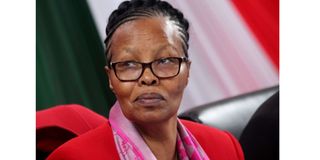Premium
Class 8 and Grade 4 to sit national exams starting next week

The Kenya National Examinations Council CEO Mercy Karogo at a past event.
What you need to know:
- Prof George Magoha asked parents to start preparing their children in other classes as they will be recalled after two weeks.
- Ms Karogo has written to head teachers asking schools to make appropriate preparations for the assessment.
- She said teachers will mark and upload the scores on the Knec portal.
Days from a seven-months-long break, Grade Four and Class Eight learners are set to start their national assessments from Monday next week.
Kenya National Examination Council (Knec) acting chief executive Mercy Karogo has written to head teachers asking schools to make appropriate preparations for the assessment.
“Class Eight and Grade Four assessments will be administered from October 19 to October 23,” said Dr Karogo in a circular dated October 8. Grade Four learners will be assessed in English, Kiswahili, Mathematics and Environmental Activities, and Science and Technology.
“It is hoped the assessments will act as end of Term One assessments in the targeted subjects,” said Ms Karogo.
Before schools were closed in March 15, they had not administered their end of term examinations. Class Eight learners will be assessed in all they have learned from Standard One to Class Seven.
The tests will also cover Class Eight term one syllabus. Ms Karogo said the administration of the assessments will be informed by the monitoring learner progress (MLP) assessment administered at Grade Three last year.
The assessment will be administered at school level as per the guidelines and assessment schedules provided by Knec.
Dr Karogo said teachers will mark and upload the scores on the Knec portal using the guidelines provided by the national examiner. She added that tests for other classes will be conducted upon reopening of the specific levels of education.
On Monday, Prof George Magoha asked parents to start preparing their children in other classes as they will be recalled after two weeks. Prof Magoha said the ministry would assess the situation in schools within the first and the second week after the first phase of reopening. The other learners are expected to start reporting back to schools from the October 26. Exams are likely to be administered a week afterwards.
Literacy and numeracy
Dr Karogo said grades One to Three will be assessed in fundamental literacy and numeracy. The subjects for assessment include English activities, Kiswahili activities and Mathematics activities.
Classes Five and Six will be assessed in English, Kiswahili, Mathematics and Science. Classes Seven and Eight will be assessed in all the Kenya Certificate Primary Education subjects.
Dr Karogo said the assessments are part of the Global Partnership for Education (GPE) grant by the government to mitigate the impact of Covid-19 on education systems and help in recovery.
The assessments are to test learner’s ability to remember what they have studied over the years and help them refocus their minds to studies after the long break. The project is helping Knec, through the National Assessment Centre, to conduct school-based learning assessments in primary schools.
Dr Karogo said the learning assessments seeks to provide a baseline on which interventions towards improving learning outcomes during the post Covid-19 pandemic period can be hinged.
They are designed to identify strengths and weaknesses in learner acquisition of specific subject content and skills with view to providing focused interventions.
“The learning assessments seeks to provide reliable and valid data to inform policy making process and provide teachers with standardised assessment tools from which to benchmark as they develop future assessments,” she said.
They are also made to enhance teacher’s capacity in developing valid, reliable and efficient learning assessments.





